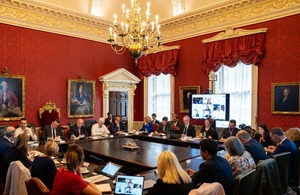Main points from today’s mini-Budget

Key points from the Chancellor’s announcement today:
- Household energy bills to be frozen at £2,500. In addition, the planned £400 rebate per household will still be paid.
- Government will subsidise wholesale energy prices for businesses, including schools and pubs.
- Government plan will reduce peak inflation by five per cent.
- Cost of energy package will be £60bn over the next six months.
- Planning infrastructure will be streamlined to make process easier, with a focus, in particular, on transport, energy, telecoms and housing.
- Personal benefits will be reduced if people do not fulfill their job search requirements.
- Legislation will be introduced to force trade unions to put pay offers to a vote of their members, in a bid to reduce the number of strikes.
- Cap on bankers’ bonuses will be removed. Chancellor has promised new regulatory reforms to follow.
- Investment zones will be set up, offering tax relief, as well as cuts to stamp duty, business rates and National Insurance levies. Four areas in the running include Tees Valley, West Midlands, Norfolk and the West of England.
- Tax systems review will mean next year’s increase in corporation tax, from 19% to 25% will be scrapped and will remain at 19%.
- Government will encourage an increase in share ownership.
- European Union laws will be removed to lessen the burdens on businesses.
- Overseas visitors will benefit from VAT-free shopping.
- Planned increases in alcohol duties for beer, cider, wine and spirits will be cancelled.
- National Insurance increases will be cancelled.
- Stamp duty will be cut, resulting in no duty on properties under £250,000, which is estimated to benefit 200,000 people.
- From April 21, 2023, the 45% rate of personal tax will be abolished and reduced to 40%, and a cut in the basic rate to 19% will be introduced a year early in April 2023.
Shortly after the Chancellor sat down, the pound fell against the US dollar to $1.115









